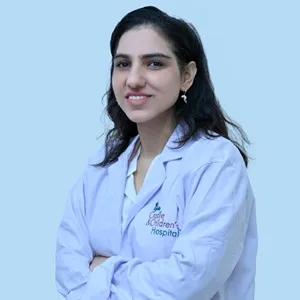Fetal medicine refers to the extra care given to babies in the womb during pregnancy. Fetal medicine is needed if the pregnant mother is diagnosed with any pre-existing medical condition that might develop into a medical condition during her pregnancy and might have medical complications at the time of delivery. You also resort to fetal medicine during pregnancy if your baby has an anomaly, i.e., some abnormality.
What is fetal medicine?
Fetal medicine is the branch of knowledge that encompasses the extra care required for babies in the womb during pregnancy, for smaller babies, or for babies with complications. Fetal medicine provides specialised care for mothers and babies with particularly complex or highly specialised needs. It is the practice of medicine where the patient is the fetus. There are traditional activities of clinical medicine such as prevention, screening, diagnosis, and therapy. These practices are directed at identifying, decreasing, and treating fetal disease.
When should you undergo fetal medicine?
You must resort to fetal medicine if you have a pre-existing medical condition before your pregnancy that might develop into a medical condition during your pregnancy and might create medical complications at the time of delivery. Also, you should see a maternal-fetal medicine specialist if your fetus has an anomaly, i.e., an abnormality during your pregnancy.
- Pre-existing medical conditions: Many pre-existing medical conditions, such as diabetes, high blood pressure, renal disease, and hypertension, need proper monitoring during the period of pregnancy. When you have such a condition and consult a maternal-fetal medicine specialist, the specialist may alter some of the medicines that you are taking to maintain your health during pregnancy and also prevent any unfavourable effects during future pregnancies. For instance, if you are diagnosed with diabetes, then resorting to fetal medicine will help you optimise your blood sugar control before conception, which will reduce the chances of fetal anomalies. For example, if you are struggling with obesity, a maternal-fetal medicine specialist will review the advantages of weight loss before pregnancy to prevent future complications related to pregnancy.
- Genetic risks: If your family members tend to develop certain diseases or if you belong to an ethnic group that has a greater risk of developing specific medical conditions, genetic screening can be done to find out your partner's risk. Preconception genetic screening has become common in recent years, with technology advancing and becoming more accessible. If your child is affected by a genetic disorder, a maternal-fetal medicine specialist can provide counselling and help you consider how this might affect your future pregnancies.
What are the benefits of fetal medicine?
Statistics show that globally, 2–3 out of every 100 children are born with birth defects. These birth defects can be prevented by the use of fetal medicine. The benefits of fetal medicine include the following:
- Providing reassurance and reducing risk among high-risk groups
- Screening for genetic defects
- Inform and prepare the parents for the birth of an affected child.
- Prediction and prevention of preterm birth
- Help plan a transfer to a tertiary care centre.
- Discontinue pregnancy with an affected fetus.
What are the different types of fetal medicine?
Besides counselling the family, other aspects of fetal medicine include non-invasive testing and invasive testing.
Non-invasive testing
These include tests ranging from ultrasonography, fetal heart evaluation by echocardiography, fetal magnetic resonance imaging (MRI), the dual test (at 10–13 weeks), and the Quadruple/Triple test (at 16–20 weeks).
Invasive testing
These tests include some sort of surgical intervention, including tests like amniocentesis, chronic villus sampling, and umbilical cord sampling.
Conclusion
Fetal medicine is an important requisite in the process of pregnancy. Maternal-fetal medicine specialists are associated with imparting more knowledge to hospitals regarding fetal medicine and are making advances every day in the field of fetal medicine. It has reduced the impact of disability associated with aneuploidy, structural anomalies, multiple pregnancies, and extreme prematurity. Fetal medicine aims to give families timely counselling, appropriate intervention, and optimization of the time and method of delivery.
Request an appointment at Apollo Cradle, Bengaluru - Koramangala. Call 1860-500-4424 to book an appointment.
There are broadly two types of fetal testing, which include non-invasive fetal testing and invasive fetal testing. There are several tests under both types of testing.
The benefits of fetal medicine include the following: ● Providing reassurance and reducing risk among high-risk groups ● Screening for genetic defects ● Inform and prepare the parents for the birth of an affected child. ● Prediction and prevention of preterm birth
Maternal-fetal medicine specialists are associated with imparting more knowledge to hospitals regarding fetal medicine and are making advances every day in the field. It has reduced the impact of disability associated with aneuploidy, structural anomalies, multiple pregnancies, and extreme prematurity.
A maternal-fetal medicine specialist, or perinatologist, is a person who has received traditional training in obstetrics and genecology but with an additional three years of training on how to treat medical complications related to pregnancy, especially those affecting the fetus.
Our Doctors
Treatments
- Blood Tests
- Down's Syndrome Screening
- Early Anomaly Scan
- Fetal Anomaly Scan
- Fetal Echocardiography Scan
- Fetal Ultrasound
- Fetal Well-Being Scans With Fetal Doppler
- Nuchal Translucency (NT Scan)
- Pre-eclampsia Screening
- Pre-Natal Screening & Test
- Screening Test For Maternal Infections
- Surveillance And Monitoring Of Twin Pregnancies
- Tests For Thalassemia And Sickle Cell Disease
- Viability Scan

 95 Patient Satisfaction Score
95 Patient Satisfaction Score
